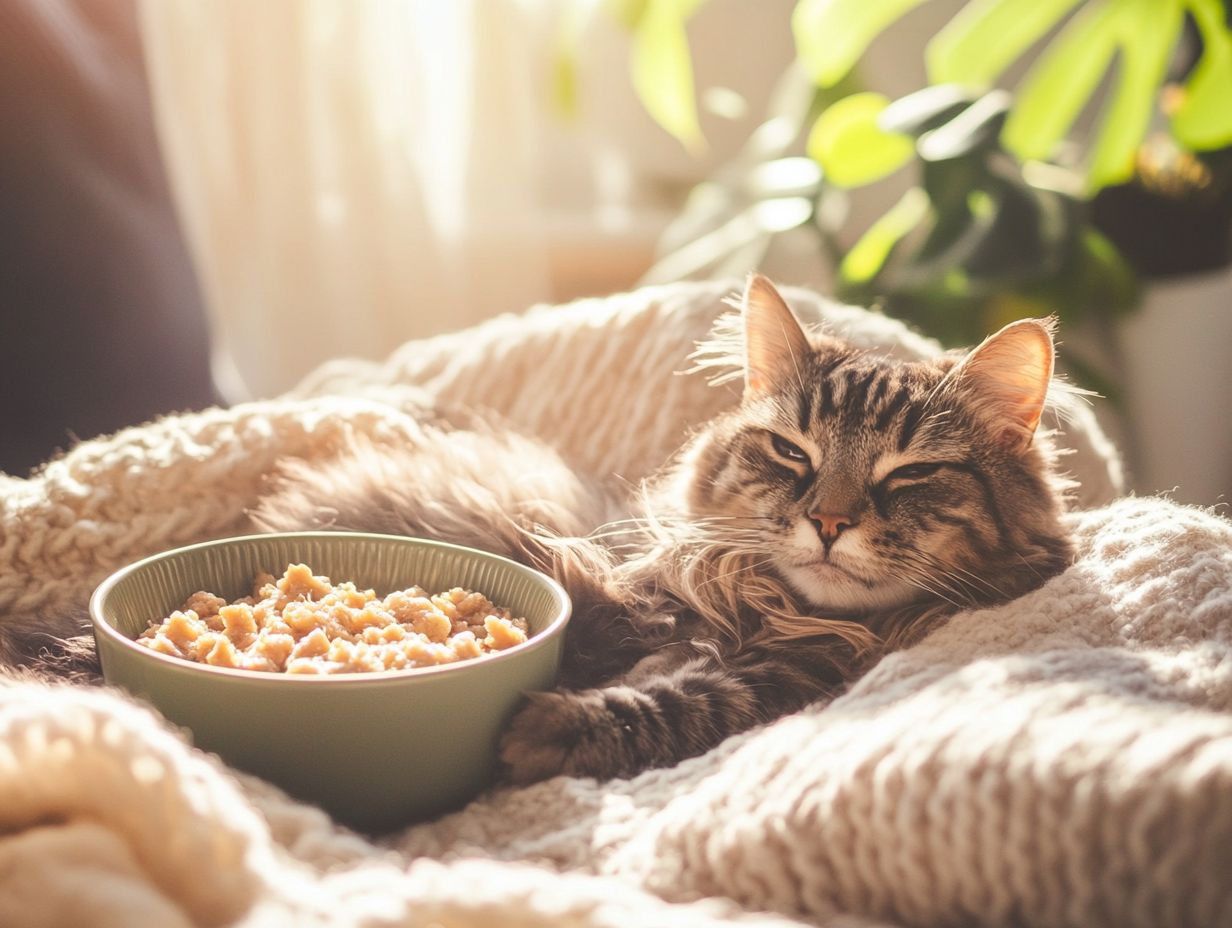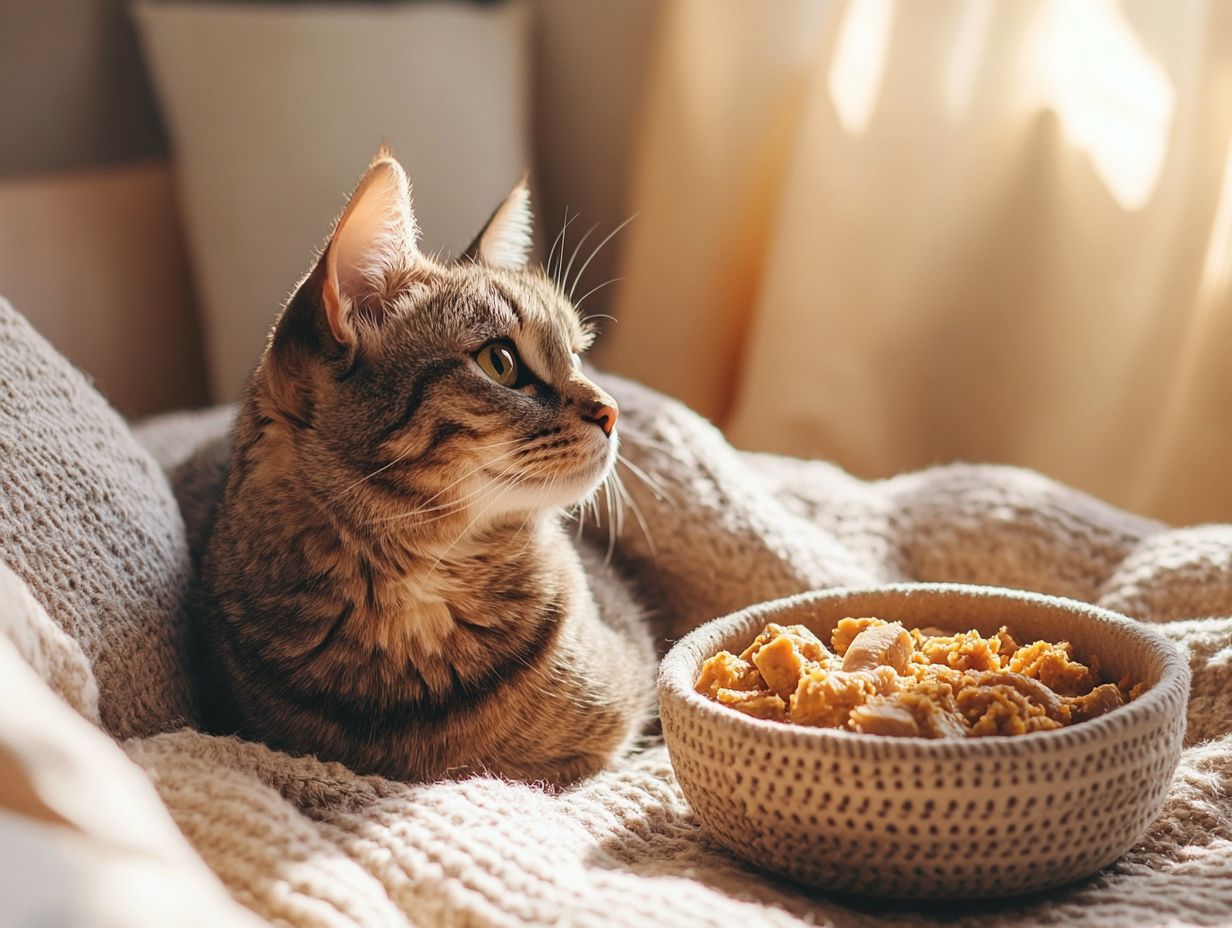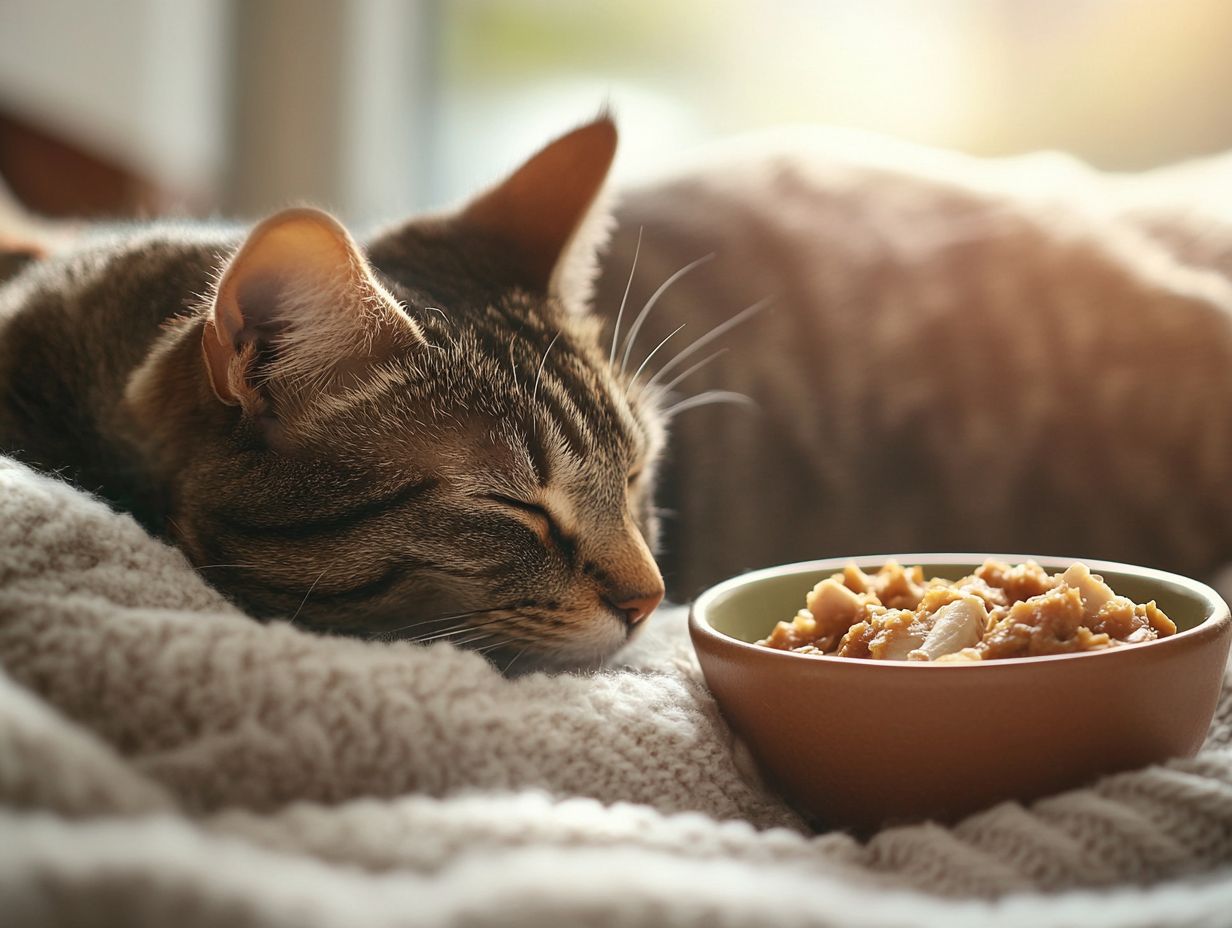As our feline companions age, their digestive systems can become more delicate, leading to sensitive stomachs that require special attention and specific senior cat food. Understanding the causes of this discomfort is essential for ensuring your senior cat’s well-being and maintaining their healthy weight.
We will explore how to identify symptoms of a sensitive stomach, the best foods to support their digestive health, what to avoid, and tips for smoothly transitioning to a new diet. However, it’s important to consult your veterinarian before making any dietary changes, especially for senior cats with specific health conditions.
Your senior cat deserves the best care—let’s focus on ensuring their digestive health with a balanced diet tailored for their unique needs!
Key Takeaways:

- Choose high-quality, easily digestible protein sources such as chicken, turkey, or fish for your senior cat’s sensitive stomach.
- Look for limited ingredient or prescription diets specially formulated for senior cats with digestive issues, such as those from brands like Hill’s Prescription Diet or Royal Canin.
- Regular vet check-ups that include discussions on dietary needs, stress management, hydration, and exercise can also help improve your senior cat’s digestive health.
What Causes Sensitive Stomachs in Senior Cats and How Can We Manage Them?
Understanding the causes of sensitive stomachs in senior cats is crucial for assessing their overall health. Issues related to the aging body, changes in nutrient requirements, and potential food allergies can contribute to this sensitivity, requiring a vet-recommended approach.
Senior cats are obligate carnivores, meaning their protein requirements are higher than carbohydrates. Therefore, it is essential for caregivers to be aware of their cat’s specific dietary needs.
Various ingredients in cat food can trigger sensitivities, leading to digestive discomfort and increasing the risk of several health issues.
These concerns can often be alleviated by using appropriate senior cat food with high-quality protein sources and incorporating joint supplements, such as glucosamine, for overall mobility.
How to Tell If Your Senior Cat Has a Sensitive Stomach?
The most effective way to determine if your senior cat has a sensitive stomach is to observe their behavior and eating habits. Common signs include:
- Vomiting
- Diarrhea
- Loss of appetite
- Changes in weight
Consulting with your veterinarian can provide valuable insight into your cat’s specific needs and help you find vet-recommended cat food that best accommodates their sensitivity, focusing on moisture content and overall health.
What are the Symptoms of a Sensitive Stomach in Senior Cats?
Symptoms may include:
- Vomiting
- Diarrhea
- Bloating
- Changes in appetite
- Weight loss or weight gain
- Refusal to eat
- Irritability
- Lethargy
Persistent digestive disturbances can lead to reduced energy and a poor mood. Timely veterinary intervention is crucial to alleviate discomfort and improve the quality of life for the affected cat.
What Are the Best Foods for Senior Cats with Sensitive Stomachs?
The best foods typically include:
- High-quality protein sources such as chicken and fish
- Easily digestible carbohydrates like sweet potatoes or rice
- Hypoallergenic diet options
Premium dry and wet food options that emphasize balanced nutrition tailored to the specific needs of senior cats are beneficial.
1. High-Quality Protein Sources
High-quality protein sources provide essential amino acids required for muscle maintenance in senior cats. Ingredients like chicken, turkey, and fish are important.
2. Easily Digestible Carbohydrates

Ingredients such as brown rice, oats, and sweet potatoes provide necessary energy without putting a strain on the digestive system. Avoid high-fiber or high-fat carbohydrates as they may worsen digestive issues.
3. Probiotics and Prebiotics
Incorporating probiotics and prebiotics can significantly enhance digestive health. Brands like Hill’s Science Diet and Royal Canin offer specialized formulas that contain these beneficial ingredients.
4. Limited Ingredient Diets
These diets help reduce the risk of allergies and intolerances by containing fewer ingredients. Brands such as Blue Buffalo and Wellness offer specially formulated options.
5. Prescription Diets
Consulting with a veterinarian can guide you toward appropriate veterinary-prescribed diets tailored to specific health conditions.
Identifying Foods to Avoid for Senior Cats with Sensitive Stomachs
It’s crucial to avoid:
- High-fat foods
- Foods with artificial ingredients
- Dairy products
Common Allergens in Cat Food
Common allergens include grains like corn, wheat, and soy. Always read labels carefully to avoid these ingredients.
How to Transition Your Senior Cat to a New Diet?
The best way to transition is gradually over a week or two. Start by mixing a small amount of the new food with the old food, increasing the amount over time. Monitor for any adverse reactions.
What Other Factors Can Help Improve Senior Cat Digestive Health?
Along with diet, factors such as hydration, regular veterinary check-ups, and exercise are essential. Hydration is particularly important as it aids in digestion and nutrient absorption. Ensure your cat has access to fresh water daily.
Regular Vet Check-Ups
These are essential to monitor your cat’s health and dietary needs.
Stress Management
Creating a calm environment can help manage stress, which is crucial for maintaining digestive health.
Proper Hydration

Encourage regular drinking and consider moisture-rich food options.
Exercise and Weight Management
Regular physical activity aids digestion and helps prevent obesity.
Frequently Asked Questions
What is senior cat digestive health?
Senior cat digestive health refers to the overall well-being of a cat’s gastrointestinal system as they age.
Why do senior cats have sensitive stomachs?
As cats age, their digestive systems may become more sensitive due to metabolic changes and potential health issues.
What are the top foods for senior cats with sensitive stomachs?
High-quality, easily digestible proteins like chicken or turkey, and limited ingredient diets are beneficial.
Are there any ingredients I should avoid in cat food for sensitive stomachs?
Avoid ingredients that may cause digestive upset, such as corn, wheat, and soy, and artificial preservatives.
How can I tell if my cat has a sensitive stomach?
Monitor for signs like vomiting, diarrhea, and changes in appetite.
Can I change my senior cat’s food to help with their sensitive stomach?
Yes, but do so gradually under veterinary guidance.
Food Storage Tips
To prevent spoilage, store dry food in a cool, dry place and refrigerate opened wet food.
For more detailed nutritional guidelines, always refer to authoritative sources like AAFCO and WSAVA.